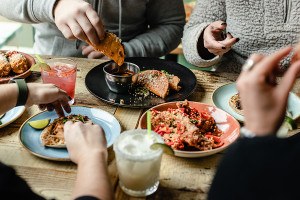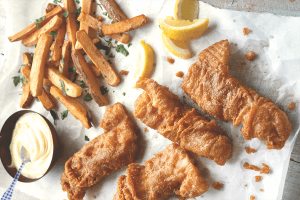Dining Out: Joining the Club
Locke-Ober
3 Winter Place, Boston
617-542-1340
Locke-Ober is Lydia Shire's red velvet-trimmed tribute to the place where she was born and made her national reputation. For this she deserves the keys to the city — if she doesn't have them already, given her long-standing relationship with many of Boston's power brokers, including Mayor Tom Menino, at whose inaugural breakfast she spoke in January. Lydia loves Boston, the Boston of Last Hurrah backroom dealmaking and Brahmins who reign with Mandarin gentility.
If you visit the lovingly refurbished Locke-Ober, you can even believe for a few hours that cold roast Boston still exists. It isn't a club, though there is a policy against jeans and sneakers. But it's easy to assume that the people who have crowded into the darkly gleaming, 125-year-old gilt-and-carved-wood rooms that Shire and co-owner Paul Licari cleaned, renovated, and reopened in the fall dine out only there or in their other clubs. They know the unspoken dress code: thick, many-colored tweeds and wide wool ties for the men, trim Talbots suits and neat coifs for the women.
Locke-Ober is seriously old-fashioned, in a way I admire. Shire and the chef she brilliantly hired, Jacky Robert, trained during the last gasp of old-line hotel cuisine, when the best restaurants in town served indeterminate Continental dishes featuring prime ribs, French sauces, and good stiff drinks. Just seeing the typeface and border of the menu made me remember the excitement of being taken to my first grown-up restaurant, and I'm sure that's the excitement Shire and Robert feel, too. The waiters' uniforms, the wonderfully heavy crockery and silver, the covered oval serving trays — they're all part of a kind of American formality derived from the English interpretation of French cuisine as codified by Escoffier, who made his reputation at London's Savoy and Carlton hotels in the 1890s. This straight-faced re-creation of service and food that have hardly existed since restaurants became, heaven forbid, fashionable is in its way awesome. I have paid higher restaurant checks in recent months — at the starkly trendsetting Mantra, for example, just around the corner and a world away — yet I expected an uncle or father to reach for the maroon folio with the gold “Locke-Ober” stamp.
It's a beautiful picture, from the hand-gilded, softly glowing walls to the mosaic vignettes Shire uncovered when she insisted that six layers of linoleum be removed. The line of curious, big, silvered domes on pulleys now gleam at the burnished bar; our waitress cheerfully cranked up a chain to show that the system still works, even though it isn't used for serving anymore. She also recited a modestly salacious story about the portrait of the semibare Yvonne that hung over our table.
But there are a few things wrong with the picture. The silvered oval plate covers may keep food warm, but it's not very elegant to see your large group's entrées stacked along the bar, waiting for enough servers to notice and carry them the few feet to the table. Three different managers telephoned to confirm a Saturday night reservation (after initially requiring a credit card number to guarantee it), yet when our party arrived, together and on time, we were ignored for a quarter-hour after announcing ourselves, with no acknowledgment that anyone had even heard our name. Six of us simply stood, chatting and puzzled, until a captain noticed we were blocking traffic and found us our table. Once we were seated, it was hard to get our server's attention — she was very nice but very busy — and impossible to flag anyone not assigned to our table. (Perhaps this was in solidarity with the five former servers who recently filed suit against the restaurant, reportedly complaining that too large an amount of their pooled tips was going to management. And we may have gotten off lightly: Colleagues have told me of unconscionable hold times and memorable rudeness when they've called to make reservations.)
The main differences I can detect from my few, long-ago visits to the old Locke-Ober are a radical upgrading in the quality of ingredients and the skill of the cooks. Shire proudly claims to have banished flour from the sauces, but anyone who remembers nouvelle cuisine knows this has nothing to do with lightening; it usually results in more butter and cream. Shire is famously fond of butter and notorious for her love of salt. There are plenty of both, though not in the amounts familiar from Biba; Robert has exercised the restraint that characterized his cooking at Maison Robert, which I considered the best contemporary French in Boston and among the best in the country. Some of the food may be simple, but none of it is light.
Luxury is everywhere on the menu, partly to justify the high prices but mostly to give meals gravitas and ceremony. The rum- and tobacco-smoked salmon ($14) and shrimp cocktail ($14) are relatively modest luxuries, the salmon notable for its silken texture and a lighter smoke than the curing ingredients would imply. The baked truffled egg cocotte with shrimp butter and shrimp toast ($15) was a throwback I loved — a soft-cooked egg baked in a covered Pyrex cup, steaming and fragrant with yolk and sliced fresh black truffle. The lobster bisque ($10) is to my mind a better choice than ” JFK's lobster stew” ($15). The bisque has the slightly peppery, cooked-down stock with tomato base of a classic bisque, giving authoritative but not domineering flavor to the cream-enriched soup. The stew, made like a pan stew with cream poured in at the end and heated just until warm, has more chunks of lobster meat but less flavor for the richness.
That's the ratio to think about with every dish: flavor to richness. I came out a bit behind in the micro-onde foie gras terrine ($22), a very generous slice of foie gras marinated, cooked in the microwave to keep all its fat and soft texture intact, and assembled into a terrine; perhaps the microwave accentuates salt, because this was the only dish that was made unpleasant by too much of it. The balance was better with the Wiener schnitzel ” à la Holstein” ($31), a Locke-Ober classic. I never tasted the original, so I can't say whether the veal was pounded thinner, as it would be in Vienna. I admired the lack of seasoning in the breading, surely part of the original, and the butter-basted sautéed egg atop the veal, which was a model of firm-but-not-tough texture. But this is fried veal cutlet, characterized mostly by melted butter in every bite. The Dover sole au Vermouth Maxim's ($34) was a reminder of the meatiest fish there is (although the thinnish fillets distracted a bit from the fully resilient experience), with a lightly herbed breading and a vermouth sauce that didn't mask the fresh sole taste. But these relatively plain hunks of luxury start to get into the price-to-flavor ratio, which is better left unexplored. So is the fact that most entrées have very few or no vegetables, requiring a side order at $6 each for, say, creamed spinach or pommes dauphine and bringing many entrées into the $40 range.
The desserts, surprisingly, are less rich than the entrées. There's still Indian pudding ($7), of course, a rich custard that seemed softer, sweeter, and lower in cornmeal flavor than the pudding I remember of old. (By contrast, the thin half-rounds of brown bread, served with the salmon, with the reassuring ridges of tin-can baking cups, had genuine New England flavors of whole meal and molasses.) The baked Alaska ($10) could have been more generous with the meringue and cake. But at least it's there, dowager glory intact. The crisp lemon cream galette ($8), a disk of lemon-scented Bavarian cream on a cookie crust, is a marvelous contemporary addition, and the famous almond macaroons ($5), slightly cherry and fresh-tasting, make a suitably plain finish.
The wine list has been both retained and refreshed, like so much here; David Weitzenhoffer, the wine steward, gives helpful suggestions about the condition of the bottles and will even steer you to a less-expensive bottle if he thinks it is a better choice.
But there will be no bargains here, and that's as it should be. Every meal at Locke-Ober is an occasion. It's a civic leader in every way, and we should be damned grateful it's back.

